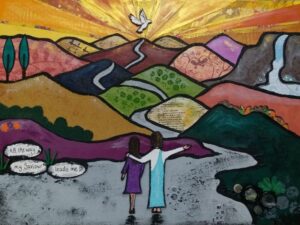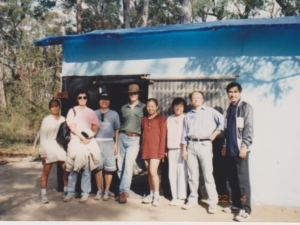
Cross Over to the Other Side
For Christians, the word ‘cross’ symbolises the centrepiece of our faith. However, it is also a verb which denotes an action, a definite and deliberate

Since January 2016, Jim Crooks has been the full-time pastor at Tayside Christian Fellowship in Perth, having worked in senior management in further and higher education for a number of years, as well as serving churches across Scotland with an itinerant ministry and a long involvement with Tilsley College in Motherwell. He currently serves as an Echoes International Trustee and he has two grandsons, Benjamin and Sámuel.
Q: How is the world reached? A: one at a time!
Of the 14 instances in the Gospels (in the NIV) where ‘compassion’ is used, 7 are about Jesus’ compassion and 5 of these instances are of His compassion for the crowd. Large groups of people seem to be a primary focus for the ministry of the Lord Jesus and He does declare His mission to be to reach significant numbers (Luke 4, citing Isaiah 61).
In practice however, the Lord Jesus spent considerable time with smaller groups and, of course, individuals: much of His ministry in healing was done in private with only a few witnesses, e.g. Peter’s mother-in-Law, Jairus’ daughter and so on. This is important for us to know because most of our lives are spent with individuals or small groups.
I have long realised that although the preaching and teaching I undertake in the public services of the church is an essential part of the mission of the church … it is the time spent with a few dear souls that seems to have the biggest impact
Jim Crooks, Pastor, Tayside Christian Fellowship Tweet
Q: How is the world reached? A: with those who spend time with Jesus!
All three gospel accounts inform us that the disciples had to be called together (e.g. Luke 9:1), which indicates that the disciples were not always together, and not always with Jesus. Some had families, and it should therefore not come as a surprise that they were not always with Jesus. There are four lists of the disciples in the bible (Matthew 10:1-4; Mark 3:13-19; Luke 6:12-16; Acts 1:13) and in each, Peter is always mentioned first. The Lord Jesus poured His life into His disciples and the Gospel of Luke is like a training manual in discipleship, but we read there that Jesus spent most of His time with only three of the twelve – Peter, James and John.
This intensive training regime eventually manifests itself in the life and conduct of these disciples: Acts 4:13 ‘Now when they saw the boldness of Peter and John, and perceived that they were uneducated, common men, they were astonished. And they recognised that they had been with Jesus.’
Q: How is the world reached? A: it starts with me!
In 2 Timothy 2, Paul describes the process of multiplication in discipleship and, in a brief sentence, incorporates four generations:
‘what you (2nd) have heard me say (1st) in the presence of many witnesses entrust to reliable people (3rd), who will also be qualified to teach others (4th).’
As I engage in pastoral ministry in Tayside Christian Fellowship (TCF) I have long realised that although the preaching and teaching I undertake in the public services of the church is an essential part of the mission of the church – expository preaching of the ‘whole counsel of God’ – it is the time spent with a few dear souls that seems to have the biggest impact. When I look back on my all too short time in the role at TCF, it is seeing God work at an individual level where I see Him most evident. It is my prayer that those whom I spend time with will also do the same with others.
Q: How is the world reached? A: I told you, one at a time!
The work of AM Schor (2009) presents four different models of the growth of the early church but the assumption underlying them all is that ‘no conversion to any religion is possible without a process of convincing’.
Christians in the early church, at some or other stage in their lives, were convinced by someone they trusted to become Christians. One of the models is related to network theory based on mathematical analysis of relational systems which ‘treats society as a web of overlapping relationships, with friendships, patronage connections, and alliances…Network theory (comes to) the groundbreaking conclusion that almost all converts to modern religious groups have friendships or familial bonds with existing members.’
Ground breaking stuff – not!
We have many instances of the interaction of the Lord Jesus at an individual level and this helps us keep our eyes on the big picture of world evangelism:
Luke 7:13 ‘…when the Lord saw her, his heart went out to her and he said, “Don’t cry.”’
Mark 10:21 ‘Jesus looked at him and loved him.’
Maybe that’s why the Lord Jesus said to His Disciples in Matthew 9:37, 38 “Then he said to his disciples, ‘The harvest is plentiful but the workers are few. Ask the Lord of the harvest, therefore, to send out workers into his harvest field.”
Maybe it’s because each of us may only be directly used for a few individuals. Your network is unique to you and the Lord Jesus still calls us today with the charge: ‘you will be my witnesses’ Acts 1:8.

For Christians, the word ‘cross’ symbolises the centrepiece of our faith. However, it is also a verb which denotes an action, a definite and deliberate

“Why not try to paint a picture based on your favourite hymn?” There are many hymns I love, so it’s always hard to choose a

I was raised in a Christian family and was 12 when the Lord called my parents to missionary service. Seeing other countries and cultures was

“You’re not Irish!” he said with a derogatory smile on his face. I was confused, because I thought I was. Some might quip that it

What playlist have you planned to use this summer and what’s it called? Nowadays many of us use playlists on our phones or tablets to

Some words can provoke a reaction. I have sometimes spiced up a conversation with friends by dropping in a word that I know will be

What do you think is the greatest challenge for missionaries? Apparently it’s not necessarily the uncomfortable climate, the unfamiliar diet, the difficulties of language, the

Interesting times we live in! Even if you were alive for the last global pandemic, none of us have experienced anything like this before. The

In this blog, let us think about how our strategies in mission compare with the early church in Acts. Here are two passages from Acts which

Standing one evening with my grandson, who was three years old at the time, we were gazing into the dark night sky. Trying to be

God’s call to us was progressive, slow and measured. Probably, in my case, it started when I was born to missionary parents who came from

Coronavirus: the word on everyone’s lips and the fear in (almost) everyone’s hearts. Response to the pandemic has been mixed. We cannot fail to be

With every job description comes information about the task at hand: what have I to do? Who do I report to? What resources are available

What does it mean to waste life? This is a burning question that all human beings need to face as individuals. Many are wasting the

Being a missionary is not an occupation that many young people would consider these days. When I started as a missionary, there was no salary,

It was toward the end of 1989 when the Lord stopped me in my tracks. For years I had heard the gospel through a Christian

In Acts 8:26-35, we eavesdrop as Philip shares the Message of Jesus with a fellow-traveller. 1) Listening to God (8:26, 29) Philip was a person open

In my first blog I mentioned how important Christian camps have been to us as a family and especially to our two boys Josiah and Joseph.

What should our strategy for mission be?That’s a question many books and articles seek to grapple with. But whilst a lot of these strategies are

These were the remarkable words that Jesus said to his disciples. They’d seen that the crowd who were there to listen to Jesus were in
If you would like to receive information about our next events feel free to sign up to our mailing list.
© Copyright 2019 GLO Europe. All Rights Reserved | GLO-Europe is a charitable Trust based at 78 Muir Street, Motherwell, ML1 1BN.